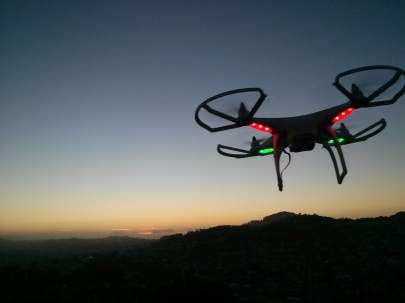Drone Deception
Friday, December 27, 2024
Written by Laurence F Sanford, Senior Analyst ASCF
Categories: ASCF Articles

Why is the federal government not providing clear, concise explanations about the drones flying over military bases and New Jersey? Why are these drones not being intercepted over American military bases? These are urgent questions that demand immediate attention.
President-elect Trump is also asking the same questions. Apparently, the intelligence community briefs to him on national security matters do not cover the subject.
Technically, a drone is a vehicle that can travel autonomously on land, air, or sea. The public outcry in New Jersey and elsewhere are over UAVs or Unmanned Aerial Vehicles. All UAVs are drones, but not all drones are UAVs. The Ukrainians have had great success with sea drone attacks on Russian ships. Mobile land robots are drones.
Vandenberg Space Force Base in California’s detection systems noticed a UVA breach in its air space. They traced it to a public park one hour away, where federal investigators found Yinpiao Zhou, a Chinese national and US resident. He had a drone in his possession with photographs of the base. Zhou was later arrested as he attempted to board a China-bound flight from San Francisco. He was charged with violating the national defense airspace, subject to up to four years in prison. Federal magistrate judge Sallie Kim moved to release Zhou from jail on personal recognizance. Federal authorities appealed the ruling and Zhou remains in jail.
UAVs can be described as:
● Multirotor - Small multirotor type civilian hobbyists and businesses use for surveys, agriculture, and miscellaneous tasks. China’s DJI dominates the world consumer market, with sales in the U.S. of $6 billion annually. The US Congress is considering banning DJI due to security considerations, as the drones’ cameras and tracking devices are connected to the internet, which is connected to China.
● Fixed wing - Small engine-driven airplanes with no pilot. The Turkish company Baykar claims 65% of the world's fixed-wing UAVs are from Turkey. They were used with great success in the Armenia-Azerbaijan War and are used in the Russia-Ukraine War.
UAS or unmanned aerial system is equipment supporting the function of UAV drones, including cameras, GPS, software, and remote controls. All drone systems have similar supporting equipment with internet connectivity; therefore, the drone data collected can be sent to China or other hostile governments or organizations.
Other questions about drones flying over America that the government is not explaining:
● Who is controlling the drones?
● What are the types of drones?
● Why can’t the drones be identified?
● Where are the drones flying from and to?
Conspiracy theories abound about the sightings:
● U.S. government-controlled drones searching for missing radioactive materials.
● Foreign entities collecting data on military and critical civilian infrastructure.
● Civilian hobbyists playing games.
● People's misconceptions.
It is inconceivable that the supposedly mightiest military in the world did not identify drones flying over the nation’s largest military complex in Norfolk, Virginia, for 17 days and did not shoot even one drone down. If Vandenberg SFB can track the UAVs, why couldn’t Langley AF base in Virginia do the same?
But then, the federal government allowed a Chinese Communist Party (CCP) spy balloon to float across America for days, gathering intelligence over military bases before shooting it down over the ocean off South Carolina. The balloon was first spotted in Alaska.
Ukraine has developed a low-cost system for detecting and shooting down drones. Dubbed “Sky Fortress,” the system was developed by two engineers in a garage. It consists of a network of almost 10,000 acoustic sensors scattered around the country that locate Russian drones and send targeting information to soldiers in the field, who then neutralize them. The cost of this system is less than two U.S.-made Patriot missiles.
In 2025, the FAA will require each drone that flies to have some remote identification kit to allow tracking and owner identification. This will identify lawful users, but what about users with malicious intent who turn off the remote identification?
Summary
The credibility of the US federal government with American citizens is justifiably low. Government spokespeople have duped/misinformed the public for years, aided and abetted by mainstream media serving as its propaganda arm. Examples of misinformation include Russiagate, COVID-19, Afghanistan, climate change as an existential threat, a secure border, Hunter Biden’s laptop, and President Biden’s physical infirmity.
China is probably not actively controlling the current wave of UAV flights. Why risk exposure when they have space satellites and cyberwarfare capabilities? The large number of drones sighted in New Jersey could be due to “copycats” who are toying with authorities, posing a potential security risk.
The purpose of the Defense Department, Homeland Security, and FBI is to protect American citizens. They should be honest with the people and answer questions honestly. If California can track a UAV, why can’t other states do so? If UAVs are not a danger, they should explain to the public how they know.
Action
● It's time to take a stand and ban Chinese-made or affiliated drones in the US. Every Chinese-made drone has the potential to send surveillance data back to China, posing a significant threat to our national security.
● Increase American drone capabilities, both offensively and defensively.
● Demand government accountability.
Peace Through Strength!











